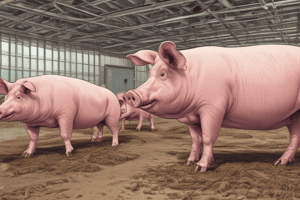Podcast
Questions and Answers
Control points for biosecurity include new additions to farm, Feeds and water, Animal contact, Wildlife and Health management procedures.
Control points for biosecurity include new additions to farm, Feeds and water, Animal contact, Wildlife and Health management procedures.
True (A)
Hygiene practices for biosecurity include allowing visitors to wear dirty clothes and footwear off the farm when visiting markets, shows, farms, and other premises with livestock.
Hygiene practices for biosecurity include allowing visitors to wear dirty clothes and footwear off the farm when visiting markets, shows, farms, and other premises with livestock.
False (B)
Buildings and equipment used in farming should not be disinfected after use from livestock.
Buildings and equipment used in farming should not be disinfected after use from livestock.
False (B)
It is not necessary to dispose of bedding that is contaminated through urine, feces, and blood away from livestock, humans, and watercourses.
It is not necessary to dispose of bedding that is contaminated through urine, feces, and blood away from livestock, humans, and watercourses.
When buying stock animals, there is no need to ask for the date/result of the last TB test carried out.
When buying stock animals, there is no need to ask for the date/result of the last TB test carried out.
Inspecting animals preferably on the farm of origin before purchase is not recommended for biosecurity.
Inspecting animals preferably on the farm of origin before purchase is not recommended for biosecurity.
New animals should not be isolated and kept separate from the herd for 20 days until ensuring they have no diseases.
New animals should not be isolated and kept separate from the herd for 20 days until ensuring they have no diseases.
If new animals show signs of illness, it is not necessary to check all other animals in the herd.
If new animals show signs of illness, it is not necessary to check all other animals in the herd.
It is recommended to dispose of bedding contaminated through urine, feces, and blood away from livestock, humans, and watercourses for biosecurity purposes.
It is recommended to dispose of bedding contaminated through urine, feces, and blood away from livestock, humans, and watercourses for biosecurity purposes.
Inspecting animals preferably on the farm of origin before purchase is a common practice for maintaining biosecurity.
Inspecting animals preferably on the farm of origin before purchase is a common practice for maintaining biosecurity.
It is not necessary to disinfect buildings and equipment used in farming after contact with livestock for biosecurity measures.
It is not necessary to disinfect buildings and equipment used in farming after contact with livestock for biosecurity measures.
Hygiene practices for biosecurity include allowing visitors to wear dirty clothes and footwear off the farm when visiting areas with livestock.
Hygiene practices for biosecurity include allowing visitors to wear dirty clothes and footwear off the farm when visiting areas with livestock.
Isolating new animals from the main herd or flock for a specific period is an important biosecurity practice when introducing them to a farm.
Isolating new animals from the main herd or flock for a specific period is an important biosecurity practice when introducing them to a farm.
It is unnecessary to ask for the date/result of the last TB test when buying stock animals for biosecurity purposes.
It is unnecessary to ask for the date/result of the last TB test when buying stock animals for biosecurity purposes.
Keeping new animals isolated and separate from the herd for a specified period is not a recommended biosecurity measure.
Keeping new animals isolated and separate from the herd for a specified period is not a recommended biosecurity measure.
If new animals show signs of illness, it is not necessary to check all other animals in the herd for biosecurity purposes.
If new animals show signs of illness, it is not necessary to check all other animals in the herd for biosecurity purposes.
Flashcards are hidden until you start studying




